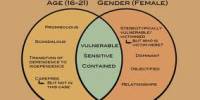Cross-cultural competency is the capacity to engage and communicate effectively with people from various cultural backgrounds. It refers to the information, abilities, and affect/motivation that allows people to adapt effectively in cross-cultural situations. It entails developing the awareness, understanding, and abilities required to negotiate and adapt to cultural differences in order to establish meaningful connections and successful interactions.
Cross-cultural competence is defined here as an individual ability that leads to intercultural effectiveness regardless of the specific cultural intersection. The concept may be related to what is known as cultural adaptability. Although some components of cognition, behavior, or affect may be more important in a given country or location, evidence suggests that a basic set of competencies allows adaptability to any culture.
Cross-cultural competence is a set of characteristics that contribute to intercultural effectiveness rather than an aim in itself. It is critical in today’s globalized world, when people from many cultures routinely interact in a variety of personal and professional settings. Unlike prior models, which emphasized subjective results by focusing on adjustment, the outcomes of interest here encompass both subjective and objective outcomes.
Here are some key components of cross-cultural competence:
- Cultural Awareness: This entails being aware of and admitting one’s own cultural prejudices, ideas, and preconceptions, as well as being open to learning about and understanding other cultures. It also requires comprehending the concept of cultural relativism, which acknowledges that diverse cultures have their own set of values and standards.
- Cultural Knowledge: This component entails learning about diverse cultures’ customs, traditions, history, religion, language, and social standards. Individuals who have a thorough awareness of these features are better able to make educated judgments and engage in courteous and appropriate relationships.
- Communication Skills: Effective cross-cultural communication is essential. This involves not only being proficient in the language of the culture you’re interacting with but also understanding non-verbal communication cues, such as body language, facial expressions, and gestures. Moreover, it’s crucial to adapt your communication style to fit the expectations and preferences of the other culture.
- Empathy and Respect: Cross-cultural competence involves showing respect for other cultures and demonstrating empathy toward individuals from diverse backgrounds. Empathy allows you to understand and appreciate the experiences, perspectives, and feelings of people from different cultures.
- Flexibility and Adaptability: Being adaptable and flexible is essential when negotiating unknown cultural environments. This includes the capacity to modify your behavior, speech, and expectations to accommodate the cultural norms and values of the individuals with whom you engage.
Cross-cultural competency is a lifelong process that necessitates self-reflection, education, and practice. To encourage diversity, inclusivity, and effective global collaboration, many organizations and institutions prioritize cross-cultural competence training for their personnel. In an increasingly interconnected world, the ability to work and engage with people from other cultural backgrounds is a key talent for both personal and professional success.
















